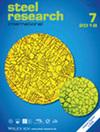Effect of Trace Element B on the Microstructure and Mechanical Properties of 8Cr4Mo4V Bearing Steel
IF 1.9
3区 材料科学
Q2 METALLURGY & METALLURGICAL ENGINEERING
引用次数: 0
Abstract
By means of salt‐bath austempering treatment, microstructure observation, X‐Ray diffraction analysis, microhardness measurement, and friction and wear performance tests for 8Cr4Mo4V steels with standard composition and with trace addition of 0.005% boron, the effect of boron on the phase composition and mechanical properties of the steel is studied. The results show that trace element boron greatly increases the content of needle‐like lower bainite in the quenched microstructure, promotes the dissolution of undissolved carbides, reduces the content of M/A island, but coarsens grains. After tempering, trace element B increases the amount of bainite generation, refines the lath martensite, and significantly promotes the precipitation of carbides, whose size is finer, and the distribution is more dispersed. In terms of mechanical properties, trace element B improves the hardness by promoting the precipitation of the second phase and refining the lath martensite, and the increase in the bainite content changes the wear mechanism and enhances the wear resistance.微量元素 B 对 8Cr4Mo4V 轴承钢微观结构和机械性能的影响
通过对标准成分和微量添加 0.005% 硼的 8Cr4Mo4V 钢进行盐浴奥氏体回火处理、显微组织观察、X 射线衍射分析、显微硬度测量以及摩擦和磨损性能测试,研究了硼对钢的相组成和机械性能的影响。结果表明,微量元素硼大大增加了淬火显微组织中针状下贝氏体的含量,促进了未溶解碳化物的溶解,降低了 M/A 岛的含量,但使晶粒变得粗大。回火后,微量元素 B 增加了贝氏体的生成量,细化了板条马氏体,并显著促进了碳化物的析出,碳化物的尺寸更细,分布更分散。在机械性能方面,微量元素 B 通过促进第二相的析出和细化板条马氏体提高了硬度,贝氏体含量的增加改变了磨损机理,增强了耐磨性。
本文章由计算机程序翻译,如有差异,请以英文原文为准。
求助全文
约1分钟内获得全文
求助全文
来源期刊

steel research international
工程技术-冶金工程
CiteScore
3.30
自引率
18.20%
发文量
319
审稿时长
1.9 months
期刊介绍:
steel research international is a journal providing a forum for the publication of high-quality manuscripts in areas ranging from process metallurgy and metal forming to materials engineering as well as process control and testing. The emphasis is on steel and on materials involved in steelmaking and the processing of steel, such as refractories and slags.
steel research international welcomes manuscripts describing basic scientific research as well as industrial research. The journal received a further increased, record-high Impact Factor of 1.522 (2018 Journal Impact Factor, Journal Citation Reports (Clarivate Analytics, 2019)).
The journal was formerly well known as "Archiv für das Eisenhüttenwesen" and "steel research"; with effect from January 1, 2006, the former "Scandinavian Journal of Metallurgy" merged with Steel Research International.
Hot Topics:
-Steels for Automotive Applications
-High-strength Steels
-Sustainable steelmaking
-Interstitially Alloyed Steels
-Electromagnetic Processing of Metals
-High Speed Forming
 求助内容:
求助内容: 应助结果提醒方式:
应助结果提醒方式:


